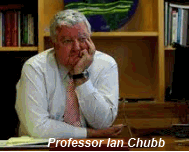|
|
|
|
|
|
|
News & Views item - March 2012 |
![]() Australia's Chief Scientist Talks Up Selling Science to the Public.
(March 29, 2012)
Australia's Chief Scientist Talks Up Selling Science to the Public.
(March 29, 2012)
 Yesterday
Australia's Chief Scientist, Ian Chubb, spoke to Australia’s Information and
Communications Technology Research Centre in its Melbourne
Big Picture seminar series on
Australia's Future in Science and Technology
Yesterday
Australia's Chief Scientist, Ian Chubb, spoke to Australia’s Information and
Communications Technology Research Centre in its Melbourne
Big Picture seminar series on
Australia's Future in Science and Technology![]() ,
noting that "a lot of our future will depend on the quality (and quantity) of
the science and technology we can mobilize to address some of the big issues
between us and a prosperous future".
,
noting that "a lot of our future will depend on the quality (and quantity) of
the science and technology we can mobilize to address some of the big issues
between us and a prosperous future".
Professor Chubb then made the observation: "[I]t seems to me that science and technology and what it delivers to us is either taken for granted, or simply ignored" and yet, "it should be of concern that in effect, our stock of scientific skills is being run down and that in Australia and in other countries around the world there is a measurable decline in the numbers of students wanting to study science, technology, education and mathematics, or STEM".
And then preaching somewhat to the converted: "Investing in science and technology serves the nation's interests. It establishes a cohort of experts that will not only maintain our 3 per cent contribution to world knowledge but also has the expertise to adapt the other 97 per cent of knowledge to solutions for Australia. Externally it builds Australia's standing in the world..."
He then issued what appears to be a plaintive plea: "I hope the Australian Government will take over responsibility for signalling, repeatedly, the importance of the STEM disciplines to the community and for ensuring the resourcing of teachers and students to gain, at the least, the scientific literacy to make a difference. A part of this is ensuring the quality of education across Australia." Followed sometime later with: "You will have heard this before, but time and time again, all the consultations return to the need to have inspirational teachers, teachers who are confident with their subject matter and have the knowledge to teach the curriculum passionately, creatively and imaginatively.
"We also need to address issues of teachers who are considered to be teaching 'out of field' or in areas in which they are not qualified. To ensure that teachers have the knowledge and confidence to inspire, we should be implementing the Australian Institute for Teaching and School Leadership national professional standard. This suggests that secondary teachers in particular, should have undertaken at least a major study in one teaching area and at least a minor study in any secondary teaching area."
The Chief Scientist then told his audience to ponder:
I want to leave you with the dilemma that I started with and that is the
United States aspires to have one million additional graduates in the STEM
subjects over the coming decade. That is, one million on top of the current
three million. Australia will produce more or less 200,000 such graduates if we
do nothing, or continue to do what we do now.
Just to keep pace, that is to achieve the same proportion of STEM graduates in
our workforce as the US, we need an additional 135,000 graduates over that
decade and that represents a 66 per cent increase at a time when the numbers of
students (or the proportion of students) taking the necessary subjects in school
is still slowly falling – and the place of science in our world is clearly not
well understood.
As The Australian's Jill Rowbotham has noted: "Professor Chubb is advising the Prime Minister on how to lift science enrolments at high schools and universities and will publish a report about the health of science in Australia in the first half of this year." But is she, her cabinet, the leader of the opposition or his shadow cabinet listening with a view of being proactive?